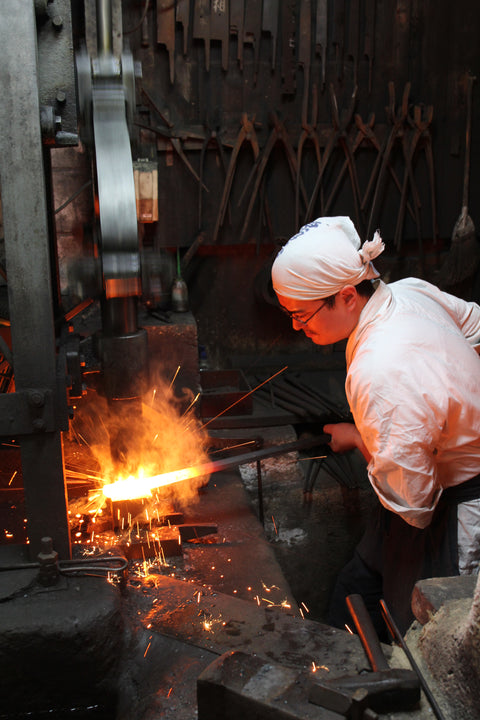When you open the box of a brand new Minamoto Akitada (源 昭忠) knife by Mizuno Tanrenjo (水野鍛錬所), the first thing to greet you is an unmistakable scent of pine charcoal — an instant 4th dimensional reminder of the prestigious status of this 150-year-old family-run Sakai workshop, which produces honyaki knives with the “Tamamono Tairan” engraving, the Japanese equivalent of a British Royal Warrant.
Established in 1872, the Mizuno workshop is certainly not the oldest by Japanese standard. However, it is considered one of the most prestigious workshops, as most of the Mizunos have worked under the crème de la crème of Japanese blacksmithing, and engaged in projects of significance.
Portage of legendary swordsmiths Masayuki Sakurai (桜井正幸) and Masamichi Morita (森田正道), the 2nd generation Mizuno blacksmith — Masanori Mizuno (水野正範) a.k.a. Teizaburo Mizuno (水野貞三郎) established the current Mizuno Tanrenjo workshop in the Sakuranocho area of Sakai, north of Osaka. When the Hōryū-ji temple (Japan’s very first UNESCO World Heritage Site) was undergoing a major renovation, Masanori Mizuno was appointed the official blacksmith to forge four “Mayokegama” — demon conquering sickles — to be installed on top of the pagoda tower.
From that point on, the Mizuno family established a tradition of respecting steel as you would respect life. They believe with the right skill, passion and focus, you could give your steel a soul. So when it’s time for Masanori’s son — 3rd generation Akiharu Mizuno to take the throne, he made sure that the soul-searching went to the next level by starting an apprenticeship under one of the most famous blacksmiths of all time — Teiichi Tsukiyama (月山貞一), one of few blacksmiths given the official National Treasure certification. Under master Tsukiyama, Akiharu Mizuno mastered mizu-honyaki forging, and his honyaki yanagiba received Japan’s Enterprise Secretary’s Award. By the time Akiharu’s son-in-law — 4th generation Yasuyuki Mizuno (水野康行) who married into the family — is ready to lead the family’s proud workshop, Mizuno Tenranjo has already received two royal visits by Prince Mikasa, who is personally a fan of their craftsmanship. Yasuyuki Mizuno once said that the reason he was driven to do the highest level of work is because he did’t want his sharpener — Tsutomu Minamiura (南浦 力) to feel an absence of soul in the knives he forged. He felt that his sharpener was also thinking the same. So they were locked in a cycle of not letting each other down.
Like his father-in-law, Yasuyuki Mizuno does not have a son to take over the family workshop. His daughter — Nanako Mizuno (水野七菜子) — not only handles orders and logistics, but is also known to be an extremely skilled female blacksmith herself. But forging knives in a boiling workshop is also arduous labour, and the long hours of work each day means she will not be able to forge knives and raise kids simultaneously. Without kids of her own, the legend of Mizuno would end with her being the last Mizuno blacksmith. Fortunately Nanako met her love — theatre actor Jun-san — who agreed to take on the challenge. From the start Jun understood the enormous weight that has been put on him to live up to the status and expectations people have given to the name.


Japanese family businesses place greater importance on talents and abilities over bloodlines. It is not uncommon for a talented non-descendant to join a family in order to carry on the family mon (crest). And talented Jun Mizuno (水野淳) is! In his 40s and behind a pair of glasses, Jun Mizuno (a.k.a. Noritada Mizuno 水野範忠) still looks like the handsome theatre actor he once was. But when standing in front of that pine charcoal powered forge, there is no doubt that he’s became a master in blacksmithing. His superior craftsmanship and extraordinary honyaki katana works have been recognised by two of Japan’s top Ichinomiyas (shrines) which have commissioned his katanas to become the shrines’ permanent collections — an extraordinary accolade and recognition for a blacksmith of his age.
150 years later, the four sickles forged by 2nd generation Mizuno, facing four cardinal directions on top of the five-story wooden building, are still protecting the buddhist temples from evil spirits and reminding the family workshop the importance of souls in their works. Despite the high cost of pine charcoals, and the painstaking jobs to maintain a constant temperature, Mizuno workshop kept the tradition of pine charcoal forge.
Next time when you open the box of a new Akitada honyaki knife, after being greeted with that unmistakable scent of pine charcoal, and before admiring the beautiful hamon and wonderful edge geometry, take a moment to feel that soul.

